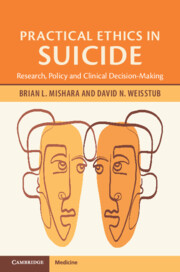Book contents
- Practical Ethics in Suicide
- Practical Ethics in Suicide
- Copyright page
- Contents
- Preface
- Acknowledgements
- 1 Ethical Perspectives to Guide Decision-Making
- 2 Moral Dilemmas in Helpline Rescue Policies
- 3 Ethical Challenges in Suicide Research
- 4 The Control of Suicide Promotion over the Internet
- 5 Genetic Testing for Suicide Risk Assessment
- 6 Suicide and Civil Commitment
- 7 The Legal Status of Suicide
- 8 The Rhetoric of Assisted Suicide and Euthanasia (‘Medical Assistance in Dying’)
- 9 Suicide Prevention and the Expansion of Medical Assistance in Dying
- 10 Conclusion: My Brother’s Keeper
- References
- Index
7 - The Legal Status of Suicide
Published online by Cambridge University Press: 15 February 2024
- Practical Ethics in Suicide
- Practical Ethics in Suicide
- Copyright page
- Contents
- Preface
- Acknowledgements
- 1 Ethical Perspectives to Guide Decision-Making
- 2 Moral Dilemmas in Helpline Rescue Policies
- 3 Ethical Challenges in Suicide Research
- 4 The Control of Suicide Promotion over the Internet
- 5 Genetic Testing for Suicide Risk Assessment
- 6 Suicide and Civil Commitment
- 7 The Legal Status of Suicide
- 8 The Rhetoric of Assisted Suicide and Euthanasia (‘Medical Assistance in Dying’)
- 9 Suicide Prevention and the Expansion of Medical Assistance in Dying
- 10 Conclusion: My Brother’s Keeper
- References
- Index
Summary
In 17 countries suicide is currently illegal, and an additional 20 countries follow Islamic or Sharia law where suicide attempters may be punished with jail sentences. The majority of countries have laws making it illegal to abet, aid or encourage suicide, but the nature and punishment of the illegal actions varies. Laws in places with civil, common law, Islamic law and traditional law systems are compared. Great variances in application were noted, sometimes within countries. It is impossible to estimate the number of persons currently in jail for attempted suicide, but jail sentences are still given. Some countries do not prosecute suicide attempters despite the laws, while others consistently jail suicide attempters. In countries where suicide attempts have been decriminalised, attempters may still face prosecution when another person is injured or dies as a result of their suicide attempt, or when the attempter is a member of the military. We discuss the roots of laws making suicide, aiding and encouraging suicide illegal and examine prospects for future changes. The recent Supreme Court Decision in Canada, invalidating the law making it illegal to assist in the suicide of physically ill people who are suffering (albeit with restrictive conditions) illustrates current trends towards “liberalisation” of assisted suicide.
- Type
- Chapter
- Information
- Practical Ethics in SuicideResearch, Policy and Clinical Decision-Making, pp. 118 - 130Publisher: Cambridge University PressPrint publication year: 2024



